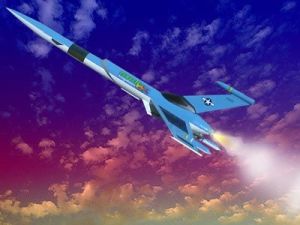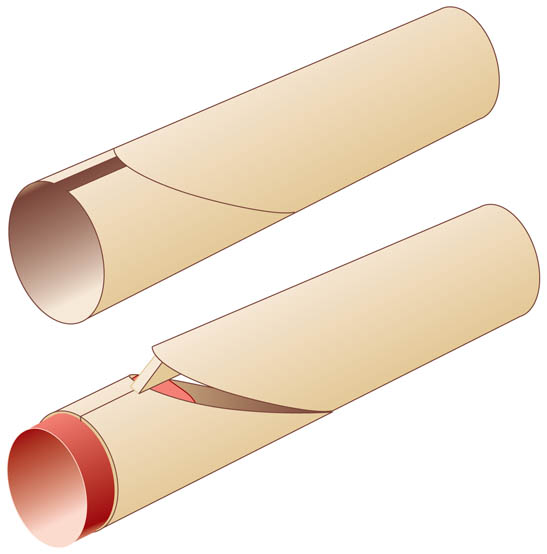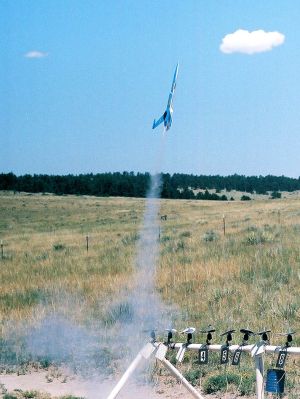Scratch Cymech Armageddonator Original Design / Scratch Built
Scratch - Cymech Armageddonator {Scratch}
Contributed by Jeff Lane
| Manufacturer: | Scratch |

Brief:
The Cymech Armageddonator is a 1/24 scale model of the existing classified stealth reconnaissance aircraft. The full
sized craft is powered by two regenerative air-turboramjet (RATR) engines and carries a crew of two. It uses a
synthetic aperture radar with real-time datalink for reconnaissance. Weaponry includes a small particle accelerator. A
speed of Mach 6 and a cruising altitude of 40 kilometers makes it invulnerable to any current missile system. The sleek
aircraft is made primarily of titanium with its outer edges constructed of Inconel, a heat-resistant stainless steel.
At speed the leading edges of the airframe glow white above 1,000 degrees Fahrenheit.
The model is a BT-60 based parachute recovery rocket with 18mm motor mount.
Construction:
Parts include BT-60 for the main fuselage, BT-55 for the forward fuselage, JT-55 tube coupler, balsa nose cone, paper
tail cone, launch lug, BT-20 for the motor tube, standard motor clip, centering rings, 1/8" balsa fins, balsa
cockpit, 1/8" wingtip dowels, BT-5 based sidepods with balsa nose cones and balsa ramjets, BT-5 top pod with balsa
nose cone.
Two primary goals were achieved with this model. One was to create a highly asymmetrical rocket that flies straight. The other was to experiment with a new construction technique wherein an intriguing, sleek, crescent-shaped "intake grill" was fashioned from the transition between two body tubes.
 (click on picture to enlarge) The grill was
the starting point. A curved line was drawn by hand and then carefully cut using an X-Acto knife. The most ventral 8mm
of the BT-60 remained intact. Enough BT-60 (about 6mm) was cut out lengthwise from the dorsal surface so it could be
glued down onto the JT-55 coupler. Forward from the coupler (the parachute compartment), an intact BT-55 was used. A
piece of balsa was carefully carved to provide structural support between the BT-55 and BT-60. Additional smaller
pieces of balsa were added to strengthen the "smile". Finally, automotive body filler was added to complete
the vent.
(click on picture to enlarge) The grill was
the starting point. A curved line was drawn by hand and then carefully cut using an X-Acto knife. The most ventral 8mm
of the BT-60 remained intact. Enough BT-60 (about 6mm) was cut out lengthwise from the dorsal surface so it could be
glued down onto the JT-55 coupler. Forward from the coupler (the parachute compartment), an intact BT-55 was used. A
piece of balsa was carefully carved to provide structural support between the BT-55 and BT-60. Additional smaller
pieces of balsa were added to strengthen the "smile". Finally, automotive body filler was added to complete
the vent.
The cockpit was hand-carved from a block of balsa. The tail cone is paper. The arrangement of the fins was begun with a 3-fin alignment, which was modified by eye to make the main wings a little straighter out to the side and allow room for the vestigial ventral fins. The side pods were completed and then glued into slots cut in the wings. The dowel wingtips were pointed with a pencil sharpener then glued on.

Finishing:
The paint scheme is blue enamel on top, white on bottom, with custom Testors inkjet decals.
Flight and Recovery:
Recommended engines are C6-3 and D10-5. Prep is standard wadding and chute. Recommended chutes are 18"-24".
It has flown five times on C6-3s and once on a D10-5. It never had a perfectly straight-up flight, but it's not as
bizarre a path as the SS1, either. The D10-5 flight resulted in a blown-out body tube rather than deployed chute so
there is currently substantial damage, but I keep it in the "restoration" pile.
Summary:
Kids absolutely loved it and asked how high. I always told them it's classified. It held its rightful place in the
arsenal right next to my classic Interceptor.
Sponsored Ads
 |
 |











